Request for Representation (or Why I Said “No” to Nightline)
By Charmaine Daboiku
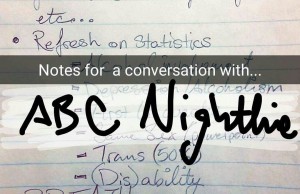 The email said “ABC News/Nightline Request for Info” in the subject line. I thought it was spam, and I almost deleted it. After all, how would ABC hear about me from little Dayton, Ohio? Inside the email was a request to talk to a producer about participating in a panel discussion about consent on college campuses—a subject I care very deeply about. Turns out, they contacted me because of the previous work I had done at my own college campus, Wright State University. I spent a year collecting stories of sexual assault from students on campus. I gathered volunteers, and we spoke those stories out loud on campus and reclaimed that public space for our empowerment and healing.
The email said “ABC News/Nightline Request for Info” in the subject line. I thought it was spam, and I almost deleted it. After all, how would ABC hear about me from little Dayton, Ohio? Inside the email was a request to talk to a producer about participating in a panel discussion about consent on college campuses—a subject I care very deeply about. Turns out, they contacted me because of the previous work I had done at my own college campus, Wright State University. I spent a year collecting stories of sexual assault from students on campus. I gathered volunteers, and we spoke those stories out loud on campus and reclaimed that public space for our empowerment and healing.
After reading the email I was in disbelief. After a year of working on this project, to have this kind of recognition and to be able to speak on this large of a platform put tears in my eyes. The producer and I set up a phone call for the next day to discuss what participating would mean. Instead of falling asleep that night my mind kept running through all the different things I could use this platform to talk about. I researched and updated my knowledge on sexual assaults in Queer relationships, with transgender people, disabled people, and people of color. With my list all made up, I could finally fall asleep.
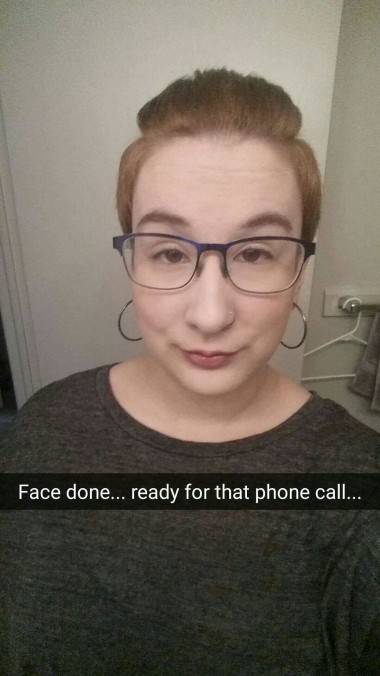 The next morning, I was ready. I ate a great breakfast and even did my face. I chatted with the producer for over two hours. We talked about consent, college campuses, and my experiences with sexual assault as well as the importance of these kinds of conversations. I was comfortable enough with him to go into detail about being raped multiple times and about wanting to bring a Queer voice into the conversation. I thought that finally an intersectional conversation about consent would happen in the mainstream media and I was thrilled that I could be a part of it. Our conversation seemed to be everything I wanted.
The next morning, I was ready. I ate a great breakfast and even did my face. I chatted with the producer for over two hours. We talked about consent, college campuses, and my experiences with sexual assault as well as the importance of these kinds of conversations. I was comfortable enough with him to go into detail about being raped multiple times and about wanting to bring a Queer voice into the conversation. I thought that finally an intersectional conversation about consent would happen in the mainstream media and I was thrilled that I could be a part of it. Our conversation seemed to be everything I wanted.
At the end of the conversation, I learned that they would contact the two men who raped me in order to get their “side” of the story. The producer said he only expected a “no comment,” but there was the potential for more. I would be one of two survivors on the panel of six people. There would be a “consent bro” (someone who goes to frat houses to talk about consent), a sex therapist who advocates for affirmative consent, a lawyer who has defended accused rapists on college campuses, and a boy who is suing his college for lack of due process. Not only all of this, but he needed to know my level of interest by that evening. I had mere hours to decide if this was something I wanted to pursue.
The truth is that I wanted it badly. I want it badly. Nightline offered to fly me out to a college campus to talk to a group of 50-100 students so that I could be a part of a panel educating them about consent, and then it would’ve been shown to millions. I could control my portion of the conversation to discuss marginalized people who aren’t ever part of this conversation; I could even demand that they use my they/them pronouns. Hell, I’m a Leo, so I’m attracted to this kind of attention on a very basic level, but I was torn. I was a mess.
I sent the producer an email with my concerns:
After I’ve slept on it some more I’ve come up with a few more questions. I know you’ve said that you would need to contact the two men who raped me to give opportunity to the “other side” to comment and to be “fair”. Unless this is a legal concern, I can’t really imagine what their comments (or lack of comment) would add to the conversation about consent. The idea that it is “fair” to reach out to rapists perpetuates the idea that survivors, especially survivors who have not reported, are liars and their story needs to be able to be “proved” to be valid. This paired with being on the same platform as someone who has been accused of rape as well as someone who get paid to defend accused rapists gives me great hesitation. Are you also contacting the survivor of the accused? It seems as though the accused has an advocate but who is the advocate for the survivors? The “consent bro”? I understand that there are complexities around campus reporting and Title IX, but I thought this story revolved around consent. If it is about consent, why would the perpetrators be able to help define what consent is? If this is a story about Title IX and campus reporting, I have no opinion to interject but would refer you to http://knowyourix.org and http://upsettingrapeculture.com.
If I do choose to participate, then I would need to know if you (those involved) understand trauma, its impact, and how triggering works? Are you (or whoever contacts the rapists) versed enough in sexual trauma to engage rapists safely? What parameters are you putting in place to ensure safety for me and for those reaching out? If I or the other survivor becomes triggered during the panel what nets are there to catch us? Will there be mental health providers there for the survivors on the panel or in the audience?
I want to participate in a conversation about consent on campus and I would love the opportunity to share a Queer perspective, but I want to make sure that I’m doing this responsibly and safely.
We set up a call the next day, and I remained hopeful. Instead of meeting these concerns with grace, he mansplained, he didn’t take my concerns seriously, he argued about semantics, and, after our conversation was over, he never called me back. I decided after we talked that I would say, “no” to any offer they gave me, but I never had to have that conversation.
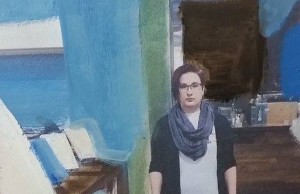 This process forced me not only to think about what kind of narrative I would be participating in, but it also forced me to re-live all of it. I re-lived all of it. I started having dreams again about the boy who raped me. In these dreams, he and I were still friends, and in a few of them I explained why what he had done was wrong. This echoed the sentiments of the last conversation I had with the TV producer, “These men don’t always know that what they are doing is rape….” Gross. I would wake up and forget that it was a dream and imagine that he and I were still besties since high school only to realize an hour later that it was all a dream.
This process forced me not only to think about what kind of narrative I would be participating in, but it also forced me to re-live all of it. I re-lived all of it. I started having dreams again about the boy who raped me. In these dreams, he and I were still friends, and in a few of them I explained why what he had done was wrong. This echoed the sentiments of the last conversation I had with the TV producer, “These men don’t always know that what they are doing is rape….” Gross. I would wake up and forget that it was a dream and imagine that he and I were still besties since high school only to realize an hour later that it was all a dream.
A month ago, I saw the boy who raped me ordering a coffee at a Starbucks. He didn’t see me, because he didn’t have to see me. I always have to see him, standing there, walking around, whenever he is in the same space I am. I am always amazed that he and I are able to live in the same physical plane. What the fuck? He went on to live a normal life, have friends, get a boyfriend, be happy, do yoga. How does he do all of that when I can’t even figure out how he takes one step in front of the other? What was I to him? His last attempt at claiming hetero masculinity?
A month ago, I found out that the man who raped me is getting married this summer. I don’t even know how to process this. He is in a loving relationship with a woman, and he is going to make a family. I found this out while googling him after learning that the producer would “have” to contact him.
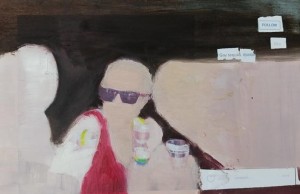 Last week, a friend of mine and a fellow survivor, emailed me about still experiencing the trauma of rape years later but being afraid because she was still tormented by the thought that her experience wasn’t “real enough.” That feeling is all too familiar to me. I didn’t have any bruises, I have no physical scares, hell, I might have even verbalized encouragement, I don’t know because I was so drunk I couldn’t stand on my own. She deserves to be believed. I deserve to be believed. We deserve to be heard without trying to yell above the brouhaha of rapists and rape apologists in the clothing of “fairness.”
Last week, a friend of mine and a fellow survivor, emailed me about still experiencing the trauma of rape years later but being afraid because she was still tormented by the thought that her experience wasn’t “real enough.” That feeling is all too familiar to me. I didn’t have any bruises, I have no physical scares, hell, I might have even verbalized encouragement, I don’t know because I was so drunk I couldn’t stand on my own. She deserves to be believed. I deserve to be believed. We deserve to be heard without trying to yell above the brouhaha of rapists and rape apologists in the clothing of “fairness.”
This is what the producer didn’t understand. His empathy was impacted only by his “journalistic integrity.” Please explain to me, Mr. Journalistic Integrity, how there are two sides to rape. Please explain to me, Mr. Producer, how a rapist gets to be on the same platform as a survivor and have just as much say in the definition of consent. Please explain to me, Mr. Fairness, how this is not just a Jerry Springer episode with better lighting and quieter words.
I am not in need of a platform so desperately that I’m going to share it with a rapist; I don’t need to be mansplained to about why consent is “confusing,” and I sure as hell don’t need you, Nightline.
 Recently, Charmaine Daboiku has taken on the role of House Spouse, taking care of two cats and a partner in Cleveland, Ohio. They recently graduated from Wright State University with a major in Fine Arts, a minor in Women’s Studies, and is currently trying to figure out how that degree applies to life and this thing called “adulthood.” More of her work can be found at CharmaineRenee.com.
Recently, Charmaine Daboiku has taken on the role of House Spouse, taking care of two cats and a partner in Cleveland, Ohio. They recently graduated from Wright State University with a major in Fine Arts, a minor in Women’s Studies, and is currently trying to figure out how that degree applies to life and this thing called “adulthood.” More of her work can be found at CharmaineRenee.com.

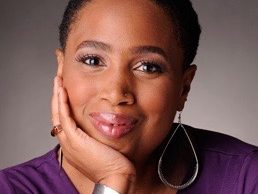
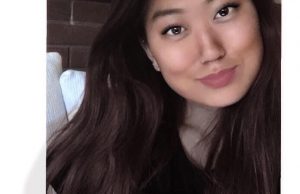
1 Comment